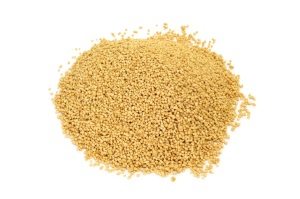
Lecithin Granules
In a recent fifteenth Authority meeting held on 20th August 2014, FSSAI adopted the minutes of the 14th meeting with a few amendments in the ‘supplementary agenda’ as regards the use of lecithin and sodium stearoyl-2-lactylate in biscuits
Other items approved in the Supplementary Agenda are
Use of synthetic colour in thermally-processed bell pepper, okra and spinach
Approval of Sodium Alginate as a food additive in ice cream
Finalization and adoption of draft FSSAI manuals on method of analysis of food
Chairperson Mr. K Chandramouli appreciated the work that the various Scientific Panel expert groups were presently undertaking to “strengthen the process of standard setting”. He said that the increase in the number of proposals of standardization that are going to the panels would be effective in implementation of the Act and safety of the consumers. He also informed the members that the proposed Amendment of the Act, to simplify the notification process (as approved by the Union Cabinet) had been presented in the Rajya Sabha in February 2014. He hoped that once the Amendment was passed setting standards would become faster.
Most ‘Agenda Items’ were approved except couple of items where comments were invited. Microbiological standards of Milk and Milk products were approved but the technical suggestions would be taken up at the time of compilation of comments on draft notification. Approval for microbiological standards for fruit and vegetable products was held up and comments were invited due to biological hazards.
Microbiological standards that were approved during this meeting are
Standards for meat and meat products
Standards for water used in food during its manufacture, preparation or treatment (water as an ingredient in food).
Standards of lactic acid – food grade
Standards of malt extract as recommended by Scientific Committee
Adoption of ICMR/DBT guidelines for probiotics with minor modification in the title as ICMR/DBT guidelines, evaluation of probiotics in food
Members were also informed about the ICMR guidelines for the safety assessment of foods derived from genetically engineered plants.
The revised title for salted fish/dried salted fish was approved as ‘Dried/Salted and Dried fishery products’. Permitted additives as approved in Appendix A could be added, while chemical and microbiological requirements are to conform to regulations. A revised list of fish species with the potential to cause histamine fish poisoning was also approved and approval was given to revise the limits in levels of histamine, pharmacologically active substances, heavy metals, biotoxins and contaminants like polychlorinated biphenyls and polycyclic aromatic hydrocarbon compounds in fish and fishery products
Final approval was made of the following draft notifications –
Food Safety and Standards (Food Products Standards and Food Additives) Second Amendment Regulations, 2013 (No 1-83/Sci Pan – Noti/FSSAI-2012 dated May 16, 2013)
Food Safety and Standards (Packaging and Labelling) Second Amendment Regulations, 2013 dated September 10, 2013 (No 1-83/Sci Pan – Noti/FSSAI-2012 dated May 16, 2013)
The draft amendment for Food Safety and Standards (Contaminants, Toxins and Residues) Regulations, 2011 w.r.t fixation of MRLs of 24 pesticides were recommended by the Scientific Panel on Pesticides and Antibiotic Residues of FSSAI and approved by the Scientific Committee in its meeting held in March 2014.
The ingredients approved by the scientific committee on Functional Foods, Nutraceuticals and Dietetic Products and other similar products were also listed and approved at the meeting.
The following Agenda items were also put forward for consideration and were approved
Draft regulation on gluten-free and low gluten-food products
Noted status on harmonisation of India’s food standards with Codex standards and other international best practices
Considered manuals on adjudicating officer, designated officer and food safety officer
Considered and approved harmonization of horizontal standards for
microbiological contamination (mycotoxins) in food
heavy metals for all food product categories
naturally-occurring toxins (NOTS) for all food product categories
FSSAI also confirmed the minutes of the 13th meeting held in January 2014. Director Codex informed the members that
The papers submitted by two members on Areca nut have been sent to the concerned Director.
FSSAI had sent its reply on May 2014 to the Joint Secretary in the Ministry of food processing industries (MoFPI) on the issue of product approval process.
Agmark was denotifying their standards, and the Bureau of Indian Standards was in the process of adopting them. Thereafter, the issue would be taken up.
Comments regarding degumming would be referred to the concerned expert group for oils and fats.

